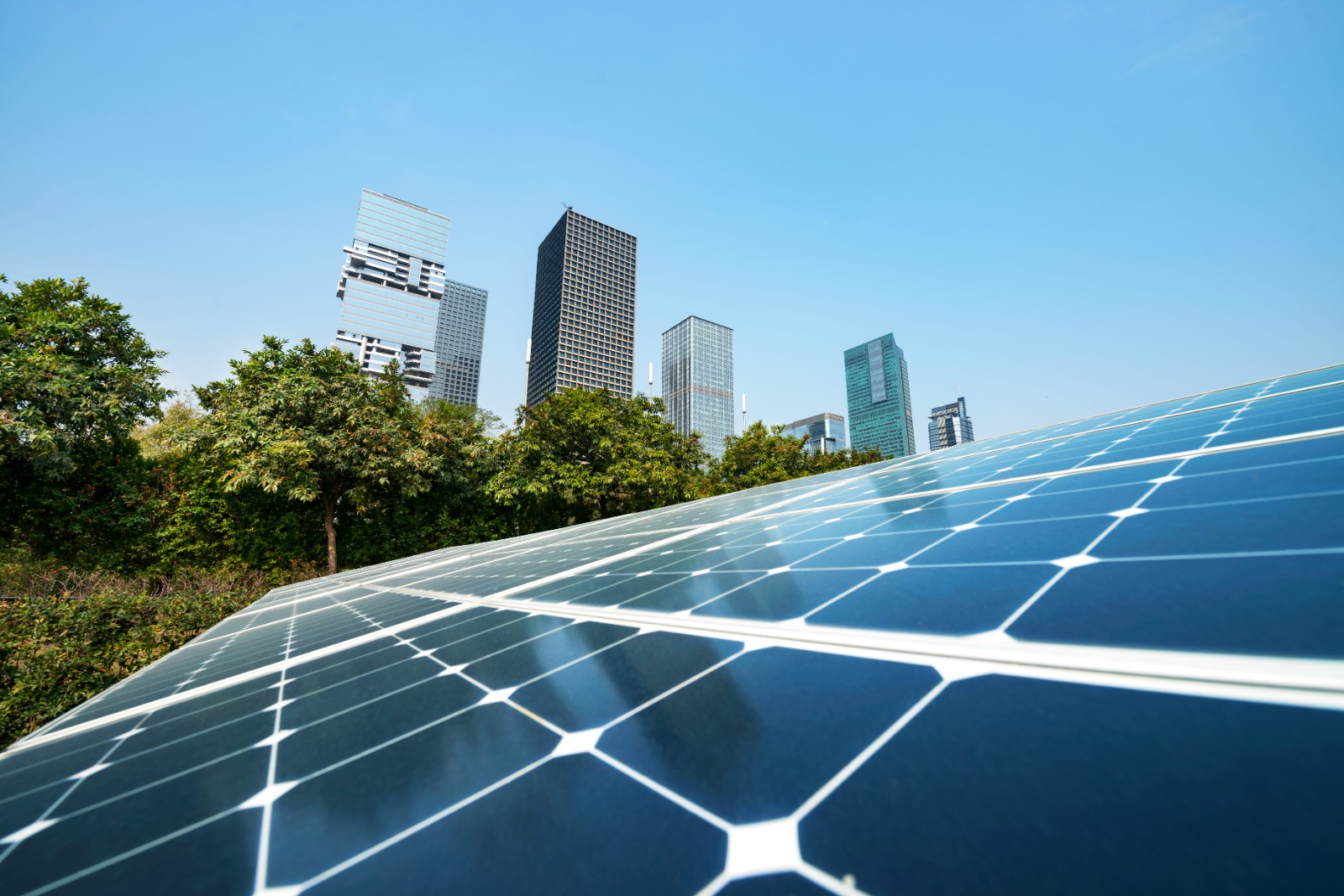 (Credit: Envato)
(Credit: Envato)Innovation and Investment in the Global Real Estate Market
The biggest trends impacting real estate in 2023
April 13, 2023Real Estate
Real estate - both in Europe and across the globe - is undergoing a significant shift as infrastructure and real estate investors converge in their search for renewable energy opportunities. The increasing complexity of developing greenfield sites and the effects of the energy crisis in Europe have brought the two sectors closer together and have renewed efforts to develop brownfield locations while making attempts to limit the footprints of new developments.

The recent passing of the Energy Performance of Buildings Directive by the European Parliament has been tempered by a compromise, with gas boilers being phased out by 2035 or 2040 instead of 2026. Microgrids and demand management solutions are becoming increasingly important in balancing supply and demand. According to a report by State Street, European funds are more interested in infrastructure opportunities than their counterparts in other regions.
Cities in Europe are also undergoing a transformation, with a focus on designing sustainable and healthy urban environments. The COVID-19 pandemic and global warming have highlighted the significant impact that cities can have on people's health, with pollution, non-optimal temperature, and opportunities for physical activity being shaped by the urban environment. This is also evident in the strong interest being exhibited in the Paris PLUb, which is set to define the future of urban planning in the French capital for decades to come. Experts in long-term care investments and healthcare assets in Europe emphasised the need to prioritise green cities and active lifestyles.
Real estate investors must consider the carbon risk-profile of their portfolios to avoid zero rental growth or obsolescence, according to Aviva Investors. Managing Director for Real Estate, Ben Sanderson, stated that asset managers must take a more active role in their stock and put assets on a net-zero pathway. Sanderson also warned that the risk of assets becoming stranded or obsolete due to rising ESG standards was another reason for fund managers to engage with their portfolios. Aviva has been focusing on sustainability in its recent deals, including the acquisition of residential property in Spain and a major sustainability-driven refurbishment in London.
In the UK, a new report from law firm TLT and real estate consultancy Gerald Eve highlights the importance of optimising land use to meet the country's net-zero targets. Competing land-use priorities, such as renewable generation, industry, affordable housing, food security, and biodiversity, present one of the biggest challenges to the UK's efforts to achieve net-zero emissions.
Colliers' CEO for the UK and Ireland, Tony Horrell, believes that the UK is ahead of most other markets in terms of realistic repricing, which is necessary to stimulate demand. He added that the economy is key to bringing confidence to the real estate market and that the UK is doing the right things, but there must be a repricing of real estate to get transactions going again. Despite the collapse of Silicon Valley Bank's UK division, Horrell believes interest rates will not jump again, and he sees that there is cautious optimism in the market.
The APAC region is increasingly attractive to investors, as it is forecast to contribute 60% of global growth by 2030. A report by State Street reveals that 44% of APAC investors are focusing on infrastructure. Germany-based global investment firm Patrizia has launched its largest ever infrastructure strategy dedicated to APAC, with an aim to manage up to $1bn in assets. Despite the region's growth potential, it currently has a $900bn annual shortfall in infrastructure funding, creating opportunities for private capital to invest in strategic infrastructure.
David Grover, CEO of the leading Saudi Arabian real estate company ROSHN Group, spoke about the role of micro-communities within giga-developments in the Kingdom and their commitment to job creation, GDP growth, and value. The company has been sharing insights about the development of real estate giga-projects in the rapidly growing economy, as well as showcasing the country's real estate investment opportunities and advanced development. Part of this showcase included the first Saudi Arabian-built AI-powered humanoid robot, Sara, which is capable of holding conversations with people about subjects including ROSHN and the ambitious Vision 2030 project in both Arabic and English.

For the perfect chance to discuss all of these issues and many more, don’t miss out on Europe GRI 2023, taking place in Paris on September 12-13. Join us there for a series of high-level discussions with senior investors, lenders, and developers active in the real estate markets all across Europe and the rest of the world.
Written by Rory Hickman
Infrastructure Goes Green

(Credit: liufuyu | envato)
Property landlords are increasingly becoming infrastructure owners themselves, with buildings playing a significant and ever-growing role in energy generation. Germany's Catella Residential Investment Management (CRIM) and Romania’s CTP are among the firms investing in energy-positive buildings and green energy, respectively. However, experts warn that the transition to renewables will not be easy or fast, and many challenges remain.The recent passing of the Energy Performance of Buildings Directive by the European Parliament has been tempered by a compromise, with gas boilers being phased out by 2035 or 2040 instead of 2026. Microgrids and demand management solutions are becoming increasingly important in balancing supply and demand. According to a report by State Street, European funds are more interested in infrastructure opportunities than their counterparts in other regions.
Cities in Europe are also undergoing a transformation, with a focus on designing sustainable and healthy urban environments. The COVID-19 pandemic and global warming have highlighted the significant impact that cities can have on people's health, with pollution, non-optimal temperature, and opportunities for physical activity being shaped by the urban environment. This is also evident in the strong interest being exhibited in the Paris PLUb, which is set to define the future of urban planning in the French capital for decades to come. Experts in long-term care investments and healthcare assets in Europe emphasised the need to prioritise green cities and active lifestyles.
The Key to Net-Zero

(Credit: Chalabala | envato)
Real estate investors must consider the carbon risk-profile of their portfolios to avoid zero rental growth or obsolescence, according to Aviva Investors. Managing Director for Real Estate, Ben Sanderson, stated that asset managers must take a more active role in their stock and put assets on a net-zero pathway. Sanderson also warned that the risk of assets becoming stranded or obsolete due to rising ESG standards was another reason for fund managers to engage with their portfolios. Aviva has been focusing on sustainability in its recent deals, including the acquisition of residential property in Spain and a major sustainability-driven refurbishment in London.
In the UK, a new report from law firm TLT and real estate consultancy Gerald Eve highlights the importance of optimising land use to meet the country's net-zero targets. Competing land-use priorities, such as renewable generation, industry, affordable housing, food security, and biodiversity, present one of the biggest challenges to the UK's efforts to achieve net-zero emissions.
Colliers' CEO for the UK and Ireland, Tony Horrell, believes that the UK is ahead of most other markets in terms of realistic repricing, which is necessary to stimulate demand. He added that the economy is key to bringing confidence to the real estate market and that the UK is doing the right things, but there must be a repricing of real estate to get transactions going again. Despite the collapse of Silicon Valley Bank's UK division, Horrell believes interest rates will not jump again, and he sees that there is cautious optimism in the market.
Global Tech Trends

(Credit: leungchopan | envato)
IPSX, a regulated stock exchange platform dedicated to IPOs and commercial real estate trading, is presenting itself as a way to help real estate owners raise equity amid volatile debt markets. The exchange enables property owners to trade assets, bringing fractionalised ownership to those wanting to trade in real estate. IPSX's CEO hopes that retail investors will be interested in owning a share of important local properties, giving them more of a say over development in their region. The APAC region is increasingly attractive to investors, as it is forecast to contribute 60% of global growth by 2030. A report by State Street reveals that 44% of APAC investors are focusing on infrastructure. Germany-based global investment firm Patrizia has launched its largest ever infrastructure strategy dedicated to APAC, with an aim to manage up to $1bn in assets. Despite the region's growth potential, it currently has a $900bn annual shortfall in infrastructure funding, creating opportunities for private capital to invest in strategic infrastructure.
David Grover, CEO of the leading Saudi Arabian real estate company ROSHN Group, spoke about the role of micro-communities within giga-developments in the Kingdom and their commitment to job creation, GDP growth, and value. The company has been sharing insights about the development of real estate giga-projects in the rapidly growing economy, as well as showcasing the country's real estate investment opportunities and advanced development. Part of this showcase included the first Saudi Arabian-built AI-powered humanoid robot, Sara, which is capable of holding conversations with people about subjects including ROSHN and the ambitious Vision 2030 project in both Arabic and English.

ROSHN Group’s AI-powered humanoid robot - Sara (Credit: Cintia Delesalle | GRI Club)
Next Steps
The real estate sector is evolving worldwide. With a renewed dedication to sustainability, renewable energy, and healthy urban environments, as well as a pressing need for new infrastructure, investors must consider the carbon risk-profile of their portfolios and acknowledge that optimising land use is crucial to meeting net-zero targets. As the economy recovers, repricing of real estate will be necessary to stimulate demand and get transactions going again, while innovation will be required to capitalise on the opportunities that will arise.For the perfect chance to discuss all of these issues and many more, don’t miss out on Europe GRI 2023, taking place in Paris on September 12-13. Join us there for a series of high-level discussions with senior investors, lenders, and developers active in the real estate markets all across Europe and the rest of the world.
Written by Rory Hickman